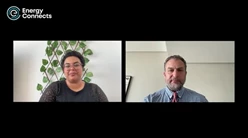Partnerships are key to achieving energy resilience in German industrial state
Germany’s North Rhine-Westphalia is deepening ties with the UAE as it seeks new partners to secure energy supplies and advance its industrial transition, His Excellency Nathanael Liminski, Minister for Federal, European, International Affairs and Media of the State of North Rhine-Westphalia in Germany said on the opening day of the ADIPEC Strategic Conference.
H.E. Minister Liminski said Europe’s largest industrial region is working to safeguard its manufacturing base while cutting emissions, calling the shift from coal to cleaner fuels “a tough balancing act.”
Natural gas and emerging hydrogen technologies, he said, will be central to maintaining industrial strength as the state accelerates its move toward renewable energy and decarbonisation.
Energy questions are security questions and vice-versa. So we are working very hard
on securing our energy system and diversifying it.
Balancing act
H.E. Liminski described the tough balancing act of maintaining his region’s great industrial base while managing energy transition and decarbonisation. In North RhineWestphalia, this will require a critical role for natural gas while new low-carbon hydrogen fuels continue their development.
“It's to keep your industrial base, but at the same time switch to renewables, to have a sustainable economy,” he said. The shift, as he described it, is “from coal to AI.” Renewable energy, new fuels, and natural gas will all play important roles.
Seeking partners for resilience
In the geopolitical context now facing countries of the European Union, security has risen as a key part of resilience. So the state-level government of North RhineWestphalia is searching for partners who will help to alleviate European dependence on limited sources of energy.
“Energy questions are security questions, and vice-versa” said H.E. Minister Liminski. “So we are working very hard on securing our energy system and diversifying it.” This includes large investments in renewable energy and emerging hydrogen-based fuels. Natural gas, also, will remain critical and North Rhine-Westphalia is searching for international partnerships to help supply it. It is a main reason why he and other leaders from this German state are at ADIPEC and are planning more visits to the UAE, seeking a deeper relationship.
Hydrogen progress
An important energy-related factor in North Rhine-Westphalia is the presence of ThyssenKrupp, which has Europe’s largest steel production plant in the state. There is also a large automative sector.
These industries are required to lower carbon emissions. State and industry leaders believe that low-carbon or ‘green’ hydrogen will play an important role. First, however, the demand for new hydrogen-related energy products must be built up.
“We were too much into small projects, studies, pilots, but we needed to get to industrial scale,” said Liminski. “With ThyssenKrupp, this is the big aim.” The state and federal German government have invested $2 billion in low-carbon hydrogen production with ThyssenKrupp industries to spur large-scale demand.
Collaboration on technology
In seeking to achieve a balance of industrial growth and energy transition, a key factor for an industrial state like North Rhine-Westphalia is coalition building at the highest levels of government. This lays the basis for public acceptance of new technologies, such as AI, and for international collaboration.
Collaboration, he says, is critical to create ‘sustainable acceptance’ for the transformation of industries. “And this is crucial because we can see right now already that in some regions in Europe, people resist to become home to data centres, knowing they consume much energy” said H.E. Minister Liminski. “Perhaps it sounds crazy, but this is a natural problem.”
Partnerships
Looking ahead, H.E. Liminski said there is much to learn from the UAE, with its long tradition of coalition building and mediating among international actors. “I really appreciate the UAE approach to diversifying partnerships.
“Perhaps we can agree on some fundamental values, however you call them, to make sure that we are not just driving the economy but driving the general good for the people.”





